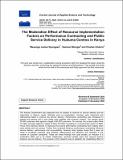| dc.contributor.author | Wesonga Justus Nyongesa, Samson Ntongai, Charles Ondoro | |
| dc.date.accessioned | 2021-05-21T09:25:19Z | |
| dc.date.available | 2021-05-21T09:25:19Z | |
| dc.date.issued | 2020 | |
| dc.identifier.uri | https://repository.maseno.ac.ke/handle/123456789/3788 | |
| dc.description.abstract | The Kenyan Government has pressures from its citizens to improve on service delivery and be responsive to citizen’s needs. Attempts such as privatization, voluntary early retirement and restructuring failed to improve the service delivery. Performance contracting was introduced to address the decline and is now being used together with Huduma Centres. The centres serve 30,000 customers daily against a target of 60,000 customers. On revenue, the centres collect Kshs 12 billion annually against a target of Kshs 30 billion according to a Government report of 2020. Focus from previous studies in resolving this around performance contracting have majorly been case studies and not surveys. Further from reviewed literature, performance contracting influence service delivery, performance and accountability. However other studies reveal that it does not result in increased customer care activities, effectiveness and efficiency and reduction in the number of customer complaints. These are mixed findings from case studies, an indicator of a moderation effect yet to be tested. Additionally, reviewed studies show that resource factors influence service delivery. The purpose of this research was to establish the moderating effect of resource implementation factors on the relationship between performance contracting and service delivery in the Huduma Centres of Kenya. The study was anchored on Vroom’s Expectancy Theory and Goal Setting Theory and utilized correlational survey research design. The target population was 276 workers at the 5 Huduma Centres in Western Region in a census survey. Pilot results (N=10) revealed 20-item instrument overall mean reliability α=0.898. Validity was checked and confirmed by expert review. Results revealed proportion of variance in the Service delivery explained by the resource implementation factors (∆R2=0.088; p=0.000) positively and significantly moderated the relationship significantly implying the interactive effect of resource implementation factors improved service delivery levels by 8.8%. The study concluded that performance contracting practices are significant predictors of service delivery levels; resource factors has a positive moderating effect (B= 0.197, p=0.000) on the relationship between performance contracting and service delivery. Recommendations were that firms should continue enhancing performance contracting practices by providing resource implementation factors as these efforts enhance service delivery in Huduma Centres in Kenya. The study’s significance is in contributing new literature and in government policy formulation by isolating resource implementation factors as key variables for improving public sector service delivery. | en_US |
| dc.publisher | Current Journal of Applied Science and Technology | en_US |
| dc.subject | Resource implementation factors service delivery performance contracting public service moderating variable. | en_US |
| dc.title | The Moderation Effect of Resource Implementation Factors on Performance Contracting and Public Service Delivery in Huduma Centres in Kenya | en_US |
| dc.type | Article | en_US |

